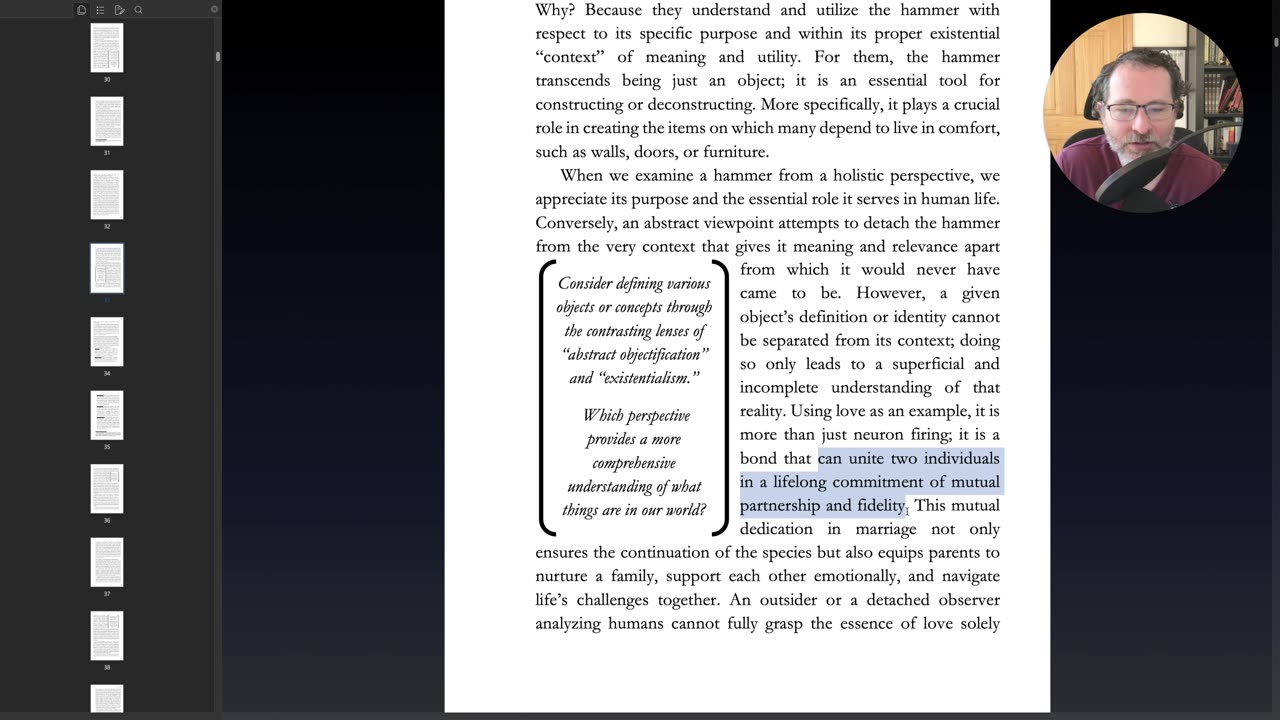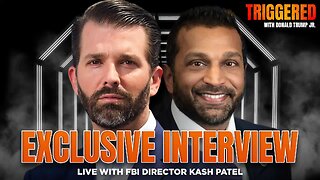Premium Only Content

(Chapter 1 Part 2) Exploring Existentialism: The Importance of Context in Understanding Reality
In this video, I explore the concept of existentialism and the dangers of abstract objectification, emphasizing how it reduces complex human experiences, like love and purpose, to mere biological or physical phenomena. I illustrate this with examples, such as the perception of a hammer, which is often stripped of its deeper significance and context. I encourage you to reflect on your own contextual realities and how they shape your understanding of the world. Additionally, I challenge you to consider the limitations of objective knowledge and the importance of recognizing the subjective influences on our perspectives. Please take time to journal about the contextual factors that shape your life and how they may offer opportunities for growth.
0:00:01 Exploring existentialism and abstract objectification
0:00:17 Entity's essence reduced to isolated existence
0:00:34 Abstract objectification in sciences like psychology
0:00:46 Love reduced to chemical reactions, losing depth
0:01:06 Decontextualizing overlooks holistic human existence
0:01:29 Hammer example: Reduced to physical traits
0:02:05 Hammer's phenomenological essence in context
0:02:31 Blacksmith values hammer's purpose over science
0:03:19 Decontextualized study misses tool's essence
0:04:08 Context vital for understanding human-made tools
0:05:06 Art’s meaning tied to cultural, historical context
0:06:16 Reductionism simplifies complex human realities
0:07:02 Object’s identity inseparable from its context
0:08:06 Love’s mystery transcends scientific analysis
0:09:00 Free will and commitment deepen relationships
0:10:26 Outsider analysis misses love’s lived essence
0:12:12 Contextual stories shape human interactions
0:14:04 Existentialism critiques simplified objectification
0:15:30 Context defines human situation, roles, universe
0:18:24 Humans are contextual, God is super-contextual
0:20:31 God’s transcendence shapes contextual meaning
0:22:17 Super-contextual norms transcend cultural bias
0:24:04 Contextualities like smartphones shape society
0:26:09 God’s super-contextuality frees from time, space
0:27:56 Jesus as contextual yet transcendent
0:29:15 God communicates through human language
0:30:20 Super-contextual view yields objective truth
0:32:29 Human perspective limited, like street-level view
0:34:23 God as omniscient author of reality’s script
0:36:22 Humans defined by contextual frameworks
0:39:21 Human choices transcend animal instincts
0:42:20 Objectivity pursuit ignores human context
0:43:46 AI reflects programmers’ subjective biases
0:46:14 Subjectivity shapes thought, emotions, decisions
0:48:21 Descartes’ “I think, therefore I am” limited
0:51:11 Divine mind enables rational world understanding
0:53:18 Buddha’s contextual view denies self-existence
0:56:41 Rational vs. spiritual paths to truth
0:58:58 Cultural subjectivity shapes moral views
1:02:14 Worldviews influence ethics, societal norms
1:05:12 Atheism as reaction to theistic context
1:07:22 Objective truth tied to subjective methods
1:09:24 Zero’s concept shaped by cultural context
1:11:20 Language’s subjectivity limits communication
1:13:23 Cultural language shapes collective values
1:15:17 Rice terminology reflects cultural importance
1:16:25 Only super-contextual yields objective truth
1:18:43 God sets contextual rules for human flourishing
1:20:39 God’s transcendence guides moral frameworks
1:22:01 Seeking God’s super-contextual view of self
-
 1:16:48
1:16:48
vivafrei
4 hours agoFBI Announces ARREST of Suspected Pipe Bomber! Judge Boasberg Should be IMPEACHED! & MORE!
65.4K46 -
 34:26
34:26
Misfits Mania
7 hours ago $13.09 earnedMISFITS MANIA: Launch Press Conference
138K21 -
 33:29
33:29
Donald Trump Jr.
6 hours agoLive With FBI Director Kash Patel, Breaking News!! | Triggered Ep.297
224K203 -
 1:22:59
1:22:59
The Quartering
4 hours agoJ6 Pipe Bomber Arrested, Candace Owens TPUSA Debate Predictions & My Staff Caused A Lawsuit!
93.4K55 -
 LIVE
LIVE
Dr Disrespect
7 hours ago🔴LIVE - DR DISRESPECT - WARZONE x BLACK OPS 7 - SEASON 1 INTEGRATION
1,133 watching -
 26:36
26:36
Jasmin Laine
2 hours agoTrump SILENCES Liberal Canada—CEO’s Oval Office Bombshell STUNS Ottawa
4.95K8 -
 27:03
27:03
The Kevin Trudeau Show Limitless
1 day agoThey're Not Hiding Aliens. They're Hiding This.
20.7K33 -
 LIVE
LIVE
LFA TV
20 hours agoLIVE & BREAKING NEWS! | THURSDAY 12/04/25
982 watching -
 2:13:10
2:13:10
The HotSeat With Todd Spears
3 hours agoEP 220: Candace Vs. TPUSA (and Why I DON'T CARE)
15.1K10 -

DeVory Darkins
6 hours agoBOMBSHELL: Congress drops BRUTAL NEWS for Tim Walz after Comer announces Probe
196K63